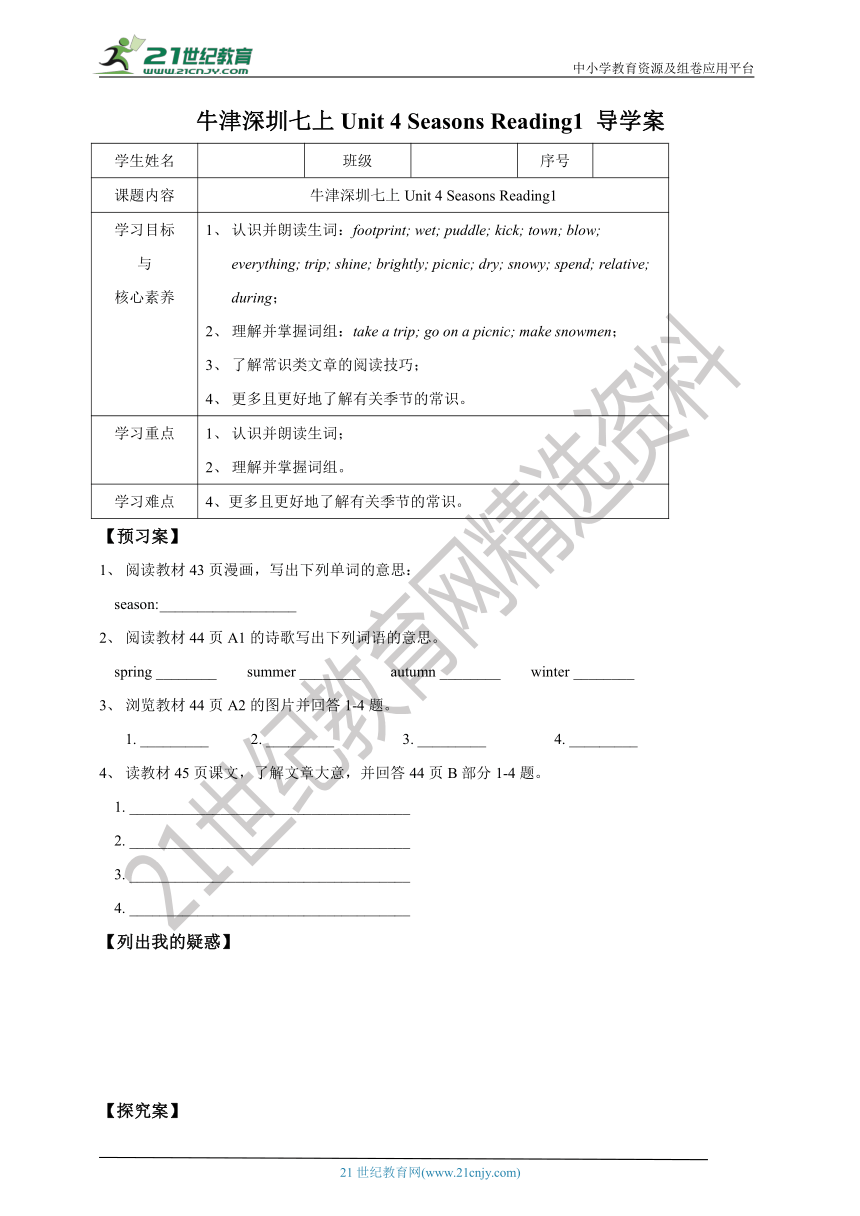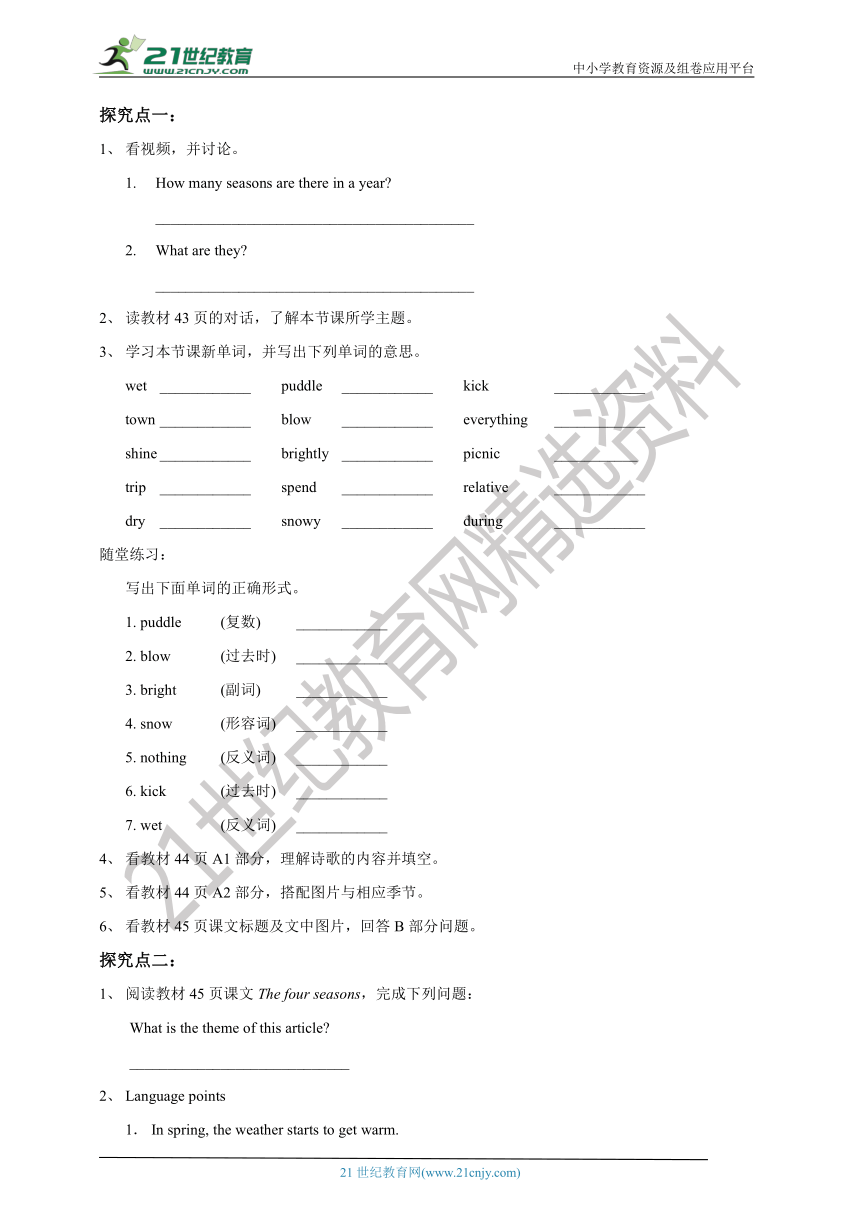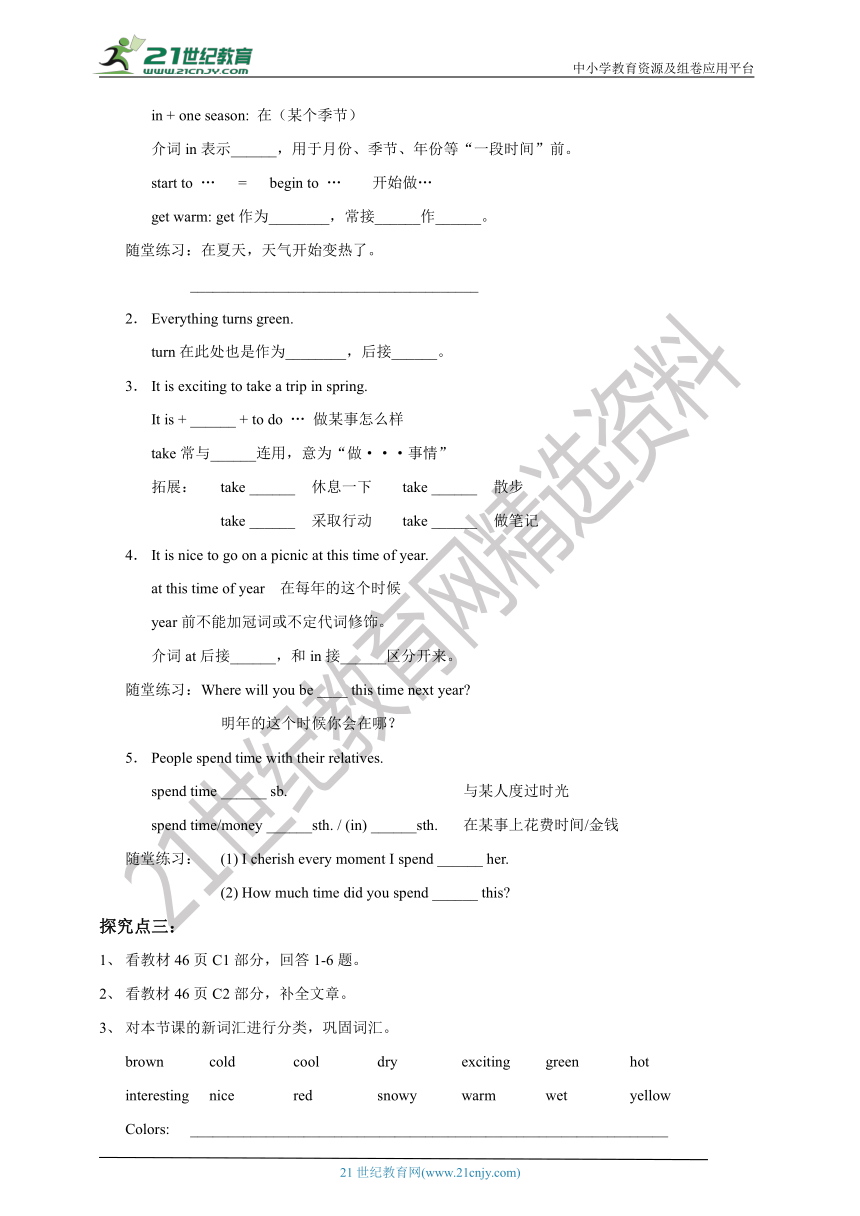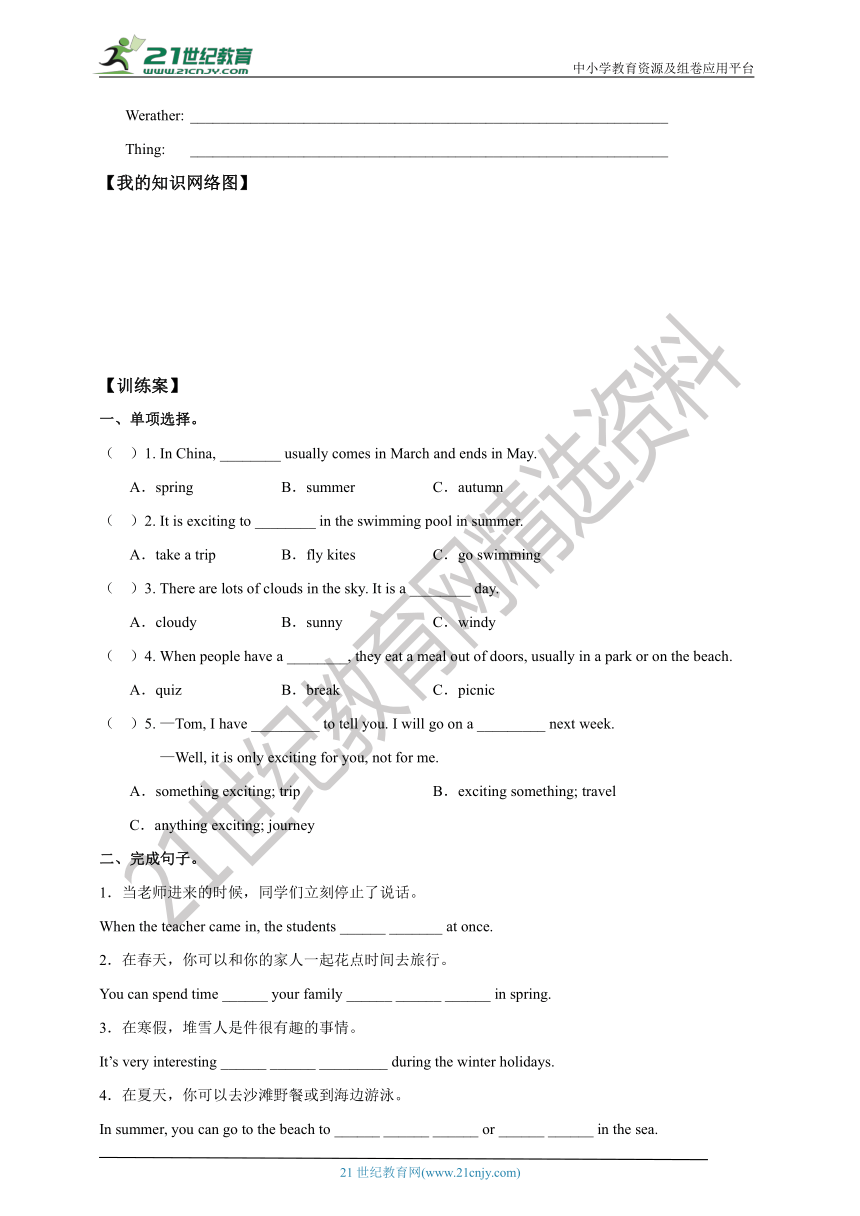Unit 4 Seasons Period 1 readingⅠ导学单
文档属性
| 名称 | Unit 4 Seasons Period 1 readingⅠ导学单 |  | |
| 格式 | doc | ||
| 文件大小 | 1.2MB | ||
| 资源类型 | 试卷 | ||
| 版本资源 | 牛津深圳版 | ||
| 科目 | 英语 | ||
| 更新时间 | 2020-09-23 15:29:14 | ||
图片预览




文档简介
中小学教育资源及组卷应用平台
牛津深圳七上Unit
4
Seasons
Reading1
导学案
学生姓名
班级
序号
课题内容
牛津深圳七上Unit
4
Seasons
Reading1
学习目标与核心素养
认识并朗读生词:footprint;
wet;
puddle;
kick;
town;
blow;
everything;
trip;
shine;
brightly;
picnic;
dry;
snowy;
spend;
relative;
during;理解并掌握词组:take
a
trip;
go
on
a
picnic;
make
snowmen;了解常识类文章的阅读技巧;更多且更好地了解有关季节的常识。
学习重点
认识并朗读生词;理解并掌握词组。
学习难点
4、更多且更好地了解有关季节的常识。
【预习案】
1、
阅读教材43页漫画,写出下列单词的意思:
season:
__________________
2、
阅读教材44页A1的诗歌写出下列词语的意思。
spring
________ summer
________ autumn
________ winter
________
3、
浏览教材44页A2的图片并回答1-4题。
1.
_________
2.
_________
3.
_________
4.
_________
4、
读教材45页课文,了解文章大意,并回答44页B部分1-4题。
1.
_____________________________________
2.
_____________________________________
3.
_____________________________________
4.
_____________________________________
【列出我的疑惑】
【探究案】
探究点一:
1、
看视频,并讨论。
1.
How
many
seasons
are
there
in
a
year?
__________________________________________
2.
What
are
they?
__________________________________________
2、
读教材43页的对话,了解本节课所学主题。
3、
学习本节课新单词,并写出下列单词的意思。
wet
____________
puddle
____________
kick
____________
town
____________
blow
____________
everything
____________
shine
____________
brightly
____________
picnic
___________
trip
____________
spend
____________
relative
____________
dry
____________
snowy
____________
during
____________
随堂练习:
写出下面单词的正确形式。
1.
puddle
(复数)
____________
2.
blow
(过去时)
____________
3.
bright
(副词)
____________
4.
snow
(形容词)
____________
5.
nothing
(反义词)
____________
6.
kick
(过去时)
____________
7.
wet
(反义词)
____________
4、
看教材44页A1部分,理解诗歌的内容并填空。
5、
看教材44页A2部分,搭配图片与相应季节。
6、
看教材45页课文标题及文中图片,回答B部分问题。
探究点二:
1、
阅读教材45页课文The
four
seasons,完成下列问题:
What
is
the
theme
of
this
article?
_____________________________
2、
Language
points
1.
In
spring,
the
weather
starts
to
get
warm.
in
+
one
season:
在(某个季节)
介词in表示______,用于月份、季节、年份等“一段时间”前。
start
to
…
=
begin
to
…
开始做…
get
warm:
get作为________,常接______作______。
随堂练习:在夏天,天气开始变热了。
______________________________________
2.
Everything
turns
green.
turn在此处也是作为________,后接______。
3.
It
is
exciting
to
take
a
trip
in
spring.
It
is
+
______
+
to
do
…
做某事怎么样
take常与______连用,意为“做···事情”
拓展:
take
______
休息一下
take
______
散步
take
______
采取行动
take
______
做笔记
4.
It
is
nice
to
go
on
a
picnic
at
this
time
of
year.
at
this
time
of
year 在每年的这个时候
year前不能加冠词或不定代词修饰。
介词at后接______,和in接______区分开来。
随堂练习:Where
will
you
be
____
this
time
next
year?
明年的这个时候你会在哪?
5.
People
spend
time
with
their
relatives.
spend
time
______
sb.
与某人度过时光
spend
time/money
______sth.
/
(in)
______sth.
在某事上花费时间/金钱
随堂练习:
(1)
I
cherish
every
moment
I
spend
______
her.
(2)
How
much
time
did
you
spend
______
this?
探究点三:
1、
看教材46页C1部分,回答1-6题。
2、
看教材46页C2部分,补全文章。
3、
对本节课的新词汇进行分类,巩固词汇。
brown
cold
cool
dry
exciting
green
hot
interesting
nice
red
snowy
warm
wet
yellow
Colors:
_______________________________________________________________
Werather:
_______________________________________________________________
Thing:
_______________________________________________________________
【我的知识网络图】
【训练案】
一、单项选择。
( )1.
In
China,
________
usually
comes
in
March
and
ends
in
May.
A.spring
B.summer
C.autumn
( )2.
It
is
exciting
to
________
in
the
swimming
pool
in
summer.
A.take
a
trip
B.fly
kites
C.go
swimming
( )3.
There
are
lots
of
clouds
in
the
sky.
It
is
a
________
day.
A.cloudy
B.sunny
C.windy
( )4.
When
people
have
a
________,
they
eat
a
meal
out
of
doors,
usually
in
a
park
or
on
the
beach.
A.quiz
B.break
C.picnic
( )5.
—Tom,
I
have
_________
to
tell
you.
I
will
go
on
a
_________
next
week.
—Well,
it
is
only
exciting
for
you,
not
for
me.
A.something
exciting;
trip
B.exciting
something;
travel
C.anything
exciting;
journey
二、完成句子。
1.当老师进来的时候,同学们立刻停止了说话。
When
the
teacher
came
in,
the
students
______
_______
at
once.
2.在春天,你可以和你的家人一起花点时间去旅行。
You
can
spend
time
______
your
family
______
______
______
in
spring.
3.在寒假,堆雪人是件很有趣的事情。
It’s
very
interesting
______
______
_________
during
the
winter
holidays.
4.在夏天,你可以去沙滩野餐或到海边游泳。
In
summer,
you
can
go
to
the
beach
to
______
______
______
or
______
______
in
the
sea.
5.在一年中的这个时候天气很温暖。
The
weather
is
very
warm
______
______
______
______
______.
三、阅读理解
Jessie
felt
her
life
so
boring
one
su
mmer
day.
She
was
tired
of
watching
TV,
she
read
all
her
books,
and
her
friends
were
on
vacation.
She
wanted
something
different
to
do.
Suddenly,
she
saw
the
lawn
mower
(割草机)
sitting
in
the
yard.
“Mom,”
she
shouted,
“I
think
I
will
mow
the
lawn.”
Her
mom
ran
into
the
yard
and
said,
“Oh
no,
you
don’t.
You’re
too
young
to
mow
the
lawn.”
“I’m
fourteen
years
old
and
know
how
to
do
it,”
Jessie
said.“Besides,
it
would
help
Dad
out,
and
he
won’t
have
to
worry
about
it
over
the
weekend.”
Mom
thought
for
a
while
and
then
decided
to
let
Jessie
give
it
a
try.
After
all,
she
was
home
and
would
keep
an
eye
on
her.
Jessie
already
knew
how
to
start
the
lawn
mower
from
watching
her
dad.
Jessie
checked
the
gas
(汽油)
to
make
sure
it
was
full,
and
put
on
her
gardening
gloves
to
protect
her
hands.
Mom
watched
from
the
kitchen
window.
Jessie
really
does
know
h
ow
to
mow
the
lawn.
She
was
very
careful
around
the
flowers
and
trees.
When
she
finished,
she
felt
so
good,
but
she
was
so
hot.
Mom
brought
her
some
ice
tea
and
said,
“You
sure
did
a
great
job.
Dad
will
be
very
surprised.”
Later
that
day,
Dad
came
home
and
said
to
Jessie’s
mom,
“You
didn’t
have
to
mow
the
lawn.
I
was
going
to
do
it
on
Saturday.
It
looks
great.
Thanks.”
“I
didn’t
mow
it.
Jessie
did.”
“Wow,
our
little
girl
is
growing
up!”
Dad
told
Jessie
what
a
great
job
she
had
done.
“It
was
fun,
and
I
will
do
it
again
next
week,”
said
Jessie.
The
neighbor
next
door
came
by
and
asked
Jessie
if
she
wanted
to
mow
his
lawn
and
make
some
money.
“Sure!”
said
Jessie.
Jessie
began
mowing
his
lawn.
Two
other
neighbors
asked
a
lso,
then
another
three.
Jessie
was
now
mowing
lawns
for
them
all
and
making
some
money.
She
was
no
longer
bored!
“I
won’t
have
time
to
spend
my
money,”
she
laughed
to
herself.
1.
In
order
to
do
something
different,
Jessie
decided
to
_______.
A.
read
books
B.
travel
C.
mow
the
lawn
D.
watch
TV
2.
What
does
“keep
an
eye
on”
mean?
A.保护
B.注视
C.培养
D.瞄准
3.
Before
Jessie
mowed
the
lawn,
she
_______.
A.
washed
her
hands
B.
bought
some
gas
C.
read
some
instructions
D.
put
on
her
gloves
4.
How
did
Jessie’s
father
feel
when
he
knew
Jessie
had
mowed
the
lawn?
A.
Proud
B.
Angry
C.
Relaxed
D.
Worried
5.
What
does
the
text
mainly
tell
us?
A.
Neighbors
should
learn
to
help
each
other.
B.
Mowing
the
lawn
is
a
good
way
to
make
money.
C.
Doing
something
helpful
can
make
people
happy.
D.
Children
should
help
their
parents
at
an
early
age.
答案:
【预习案】
1、
季节
2、
春天;夏天;秋天;冬天
3.
1.
d
2.
c
3.
a
4.
b
3、
1.
It
is
rainy
and
wet.
2.
People
usually
swim
in
summer.
3.
People
like
going
on
a
picnic.
4.
Children
like
playing
in
the
snow
in
winter.
【探究案】
探究点一:
1、
Four;
They
are
Spring,
Summer,
Autumn
and
Winter.
3、
湿的
水坑
踢
镇
吹
一切
照耀
明亮的
野餐
旅行
度过
亲戚
干的
下雪多的
在...期间
1.
puddles
2.
blew
3.
brightly
4.
snowy
5.
everything
6.
kicked
7.
dry
4、
winter;
summer;
spring;
autumn
5、
1.
d
2.
c
3.
a
4.
b
6、
1.
It
is
rainy
and
wet.
2.
People
usually
swim
in
summer.
3.
People
like
going
on
a
picnic.
4.
Children
like
playing
in
the
snow
in
winter.
探究点二:
1、
The
four
seasons.
2、
1.
时间;系动词;形容词;表语
In
summer,
the
weather
starts
to
get
hot.
2.
系动词;形容词;
3.
形容词;名词;a
rest;
a
walk;
action;
notes
4.
具体时间;一段时间;at
5.
with;
on;
doing;
with;
on
探究点三:
1、
1.
everything
2.
shines
3.
dry
4.
snowy
5.
spend
6.
Relatives
2、
snowy;
everything;
spend;
relatives;
trip
3、
Colors:
brown,
green,
red,
yellow
Weather:
cold,
cool,
dry,
hot,
snowy,
warm,
wet
Thing:
exciting,
interesting,
nice
【训练案】
1、1-5
ACACA
二、1.
stopped
talking
2.
with;
making
a
trip
3.
to
make
snowmen
4.
have
a
picnic;
go
swimming
5.
at
this
time
of
year
三、1-5
CBDAC
【教与学的反思】
21世纪教育网
www.21cnjy.com
精品试卷·第
2
页
(共
2
页)
HYPERLINK
"http://www.21cnjy.com/"
21世纪教育网(www.21cnjy.com)
牛津深圳七上Unit
4
Seasons
Reading1
导学案
学生姓名
班级
序号
课题内容
牛津深圳七上Unit
4
Seasons
Reading1
学习目标与核心素养
认识并朗读生词:footprint;
wet;
puddle;
kick;
town;
blow;
everything;
trip;
shine;
brightly;
picnic;
dry;
snowy;
spend;
relative;
during;理解并掌握词组:take
a
trip;
go
on
a
picnic;
make
snowmen;了解常识类文章的阅读技巧;更多且更好地了解有关季节的常识。
学习重点
认识并朗读生词;理解并掌握词组。
学习难点
4、更多且更好地了解有关季节的常识。
【预习案】
1、
阅读教材43页漫画,写出下列单词的意思:
season:
__________________
2、
阅读教材44页A1的诗歌写出下列词语的意思。
spring
________ summer
________ autumn
________ winter
________
3、
浏览教材44页A2的图片并回答1-4题。
1.
_________
2.
_________
3.
_________
4.
_________
4、
读教材45页课文,了解文章大意,并回答44页B部分1-4题。
1.
_____________________________________
2.
_____________________________________
3.
_____________________________________
4.
_____________________________________
【列出我的疑惑】
【探究案】
探究点一:
1、
看视频,并讨论。
1.
How
many
seasons
are
there
in
a
year?
__________________________________________
2.
What
are
they?
__________________________________________
2、
读教材43页的对话,了解本节课所学主题。
3、
学习本节课新单词,并写出下列单词的意思。
wet
____________
puddle
____________
kick
____________
town
____________
blow
____________
everything
____________
shine
____________
brightly
____________
picnic
___________
trip
____________
spend
____________
relative
____________
dry
____________
snowy
____________
during
____________
随堂练习:
写出下面单词的正确形式。
1.
puddle
(复数)
____________
2.
blow
(过去时)
____________
3.
bright
(副词)
____________
4.
snow
(形容词)
____________
5.
nothing
(反义词)
____________
6.
kick
(过去时)
____________
7.
wet
(反义词)
____________
4、
看教材44页A1部分,理解诗歌的内容并填空。
5、
看教材44页A2部分,搭配图片与相应季节。
6、
看教材45页课文标题及文中图片,回答B部分问题。
探究点二:
1、
阅读教材45页课文The
four
seasons,完成下列问题:
What
is
the
theme
of
this
article?
_____________________________
2、
Language
points
1.
In
spring,
the
weather
starts
to
get
warm.
in
+
one
season:
在(某个季节)
介词in表示______,用于月份、季节、年份等“一段时间”前。
start
to
…
=
begin
to
…
开始做…
get
warm:
get作为________,常接______作______。
随堂练习:在夏天,天气开始变热了。
______________________________________
2.
Everything
turns
green.
turn在此处也是作为________,后接______。
3.
It
is
exciting
to
take
a
trip
in
spring.
It
is
+
______
+
to
do
…
做某事怎么样
take常与______连用,意为“做···事情”
拓展:
take
______
休息一下
take
______
散步
take
______
采取行动
take
______
做笔记
4.
It
is
nice
to
go
on
a
picnic
at
this
time
of
year.
at
this
time
of
year 在每年的这个时候
year前不能加冠词或不定代词修饰。
介词at后接______,和in接______区分开来。
随堂练习:Where
will
you
be
____
this
time
next
year?
明年的这个时候你会在哪?
5.
People
spend
time
with
their
relatives.
spend
time
______
sb.
与某人度过时光
spend
time/money
______sth.
/
(in)
______sth.
在某事上花费时间/金钱
随堂练习:
(1)
I
cherish
every
moment
I
spend
______
her.
(2)
How
much
time
did
you
spend
______
this?
探究点三:
1、
看教材46页C1部分,回答1-6题。
2、
看教材46页C2部分,补全文章。
3、
对本节课的新词汇进行分类,巩固词汇。
brown
cold
cool
dry
exciting
green
hot
interesting
nice
red
snowy
warm
wet
yellow
Colors:
_______________________________________________________________
Werather:
_______________________________________________________________
Thing:
_______________________________________________________________
【我的知识网络图】
【训练案】
一、单项选择。
( )1.
In
China,
________
usually
comes
in
March
and
ends
in
May.
A.spring
B.summer
C.autumn
( )2.
It
is
exciting
to
________
in
the
swimming
pool
in
summer.
A.take
a
trip
B.fly
kites
C.go
swimming
( )3.
There
are
lots
of
clouds
in
the
sky.
It
is
a
________
day.
A.cloudy
B.sunny
C.windy
( )4.
When
people
have
a
________,
they
eat
a
meal
out
of
doors,
usually
in
a
park
or
on
the
beach.
A.quiz
B.break
C.picnic
( )5.
—Tom,
I
have
_________
to
tell
you.
I
will
go
on
a
_________
next
week.
—Well,
it
is
only
exciting
for
you,
not
for
me.
A.something
exciting;
trip
B.exciting
something;
travel
C.anything
exciting;
journey
二、完成句子。
1.当老师进来的时候,同学们立刻停止了说话。
When
the
teacher
came
in,
the
students
______
_______
at
once.
2.在春天,你可以和你的家人一起花点时间去旅行。
You
can
spend
time
______
your
family
______
______
______
in
spring.
3.在寒假,堆雪人是件很有趣的事情。
It’s
very
interesting
______
______
_________
during
the
winter
holidays.
4.在夏天,你可以去沙滩野餐或到海边游泳。
In
summer,
you
can
go
to
the
beach
to
______
______
______
or
______
______
in
the
sea.
5.在一年中的这个时候天气很温暖。
The
weather
is
very
warm
______
______
______
______
______.
三、阅读理解
Jessie
felt
her
life
so
boring
one
su
mmer
day.
She
was
tired
of
watching
TV,
she
read
all
her
books,
and
her
friends
were
on
vacation.
She
wanted
something
different
to
do.
Suddenly,
she
saw
the
lawn
mower
(割草机)
sitting
in
the
yard.
“Mom,”
she
shouted,
“I
think
I
will
mow
the
lawn.”
Her
mom
ran
into
the
yard
and
said,
“Oh
no,
you
don’t.
You’re
too
young
to
mow
the
lawn.”
“I’m
fourteen
years
old
and
know
how
to
do
it,”
Jessie
said.“Besides,
it
would
help
Dad
out,
and
he
won’t
have
to
worry
about
it
over
the
weekend.”
Mom
thought
for
a
while
and
then
decided
to
let
Jessie
give
it
a
try.
After
all,
she
was
home
and
would
keep
an
eye
on
her.
Jessie
already
knew
how
to
start
the
lawn
mower
from
watching
her
dad.
Jessie
checked
the
gas
(汽油)
to
make
sure
it
was
full,
and
put
on
her
gardening
gloves
to
protect
her
hands.
Mom
watched
from
the
kitchen
window.
Jessie
really
does
know
h
ow
to
mow
the
lawn.
She
was
very
careful
around
the
flowers
and
trees.
When
she
finished,
she
felt
so
good,
but
she
was
so
hot.
Mom
brought
her
some
ice
tea
and
said,
“You
sure
did
a
great
job.
Dad
will
be
very
surprised.”
Later
that
day,
Dad
came
home
and
said
to
Jessie’s
mom,
“You
didn’t
have
to
mow
the
lawn.
I
was
going
to
do
it
on
Saturday.
It
looks
great.
Thanks.”
“I
didn’t
mow
it.
Jessie
did.”
“Wow,
our
little
girl
is
growing
up!”
Dad
told
Jessie
what
a
great
job
she
had
done.
“It
was
fun,
and
I
will
do
it
again
next
week,”
said
Jessie.
The
neighbor
next
door
came
by
and
asked
Jessie
if
she
wanted
to
mow
his
lawn
and
make
some
money.
“Sure!”
said
Jessie.
Jessie
began
mowing
his
lawn.
Two
other
neighbors
asked
a
lso,
then
another
three.
Jessie
was
now
mowing
lawns
for
them
all
and
making
some
money.
She
was
no
longer
bored!
“I
won’t
have
time
to
spend
my
money,”
she
laughed
to
herself.
1.
In
order
to
do
something
different,
Jessie
decided
to
_______.
A.
read
books
B.
travel
C.
mow
the
lawn
D.
watch
TV
2.
What
does
“keep
an
eye
on”
mean?
A.保护
B.注视
C.培养
D.瞄准
3.
Before
Jessie
mowed
the
lawn,
she
_______.
A.
washed
her
hands
B.
bought
some
gas
C.
read
some
instructions
D.
put
on
her
gloves
4.
How
did
Jessie’s
father
feel
when
he
knew
Jessie
had
mowed
the
lawn?
A.
Proud
B.
Angry
C.
Relaxed
D.
Worried
5.
What
does
the
text
mainly
tell
us?
A.
Neighbors
should
learn
to
help
each
other.
B.
Mowing
the
lawn
is
a
good
way
to
make
money.
C.
Doing
something
helpful
can
make
people
happy.
D.
Children
should
help
their
parents
at
an
early
age.
答案:
【预习案】
1、
季节
2、
春天;夏天;秋天;冬天
3.
1.
d
2.
c
3.
a
4.
b
3、
1.
It
is
rainy
and
wet.
2.
People
usually
swim
in
summer.
3.
People
like
going
on
a
picnic.
4.
Children
like
playing
in
the
snow
in
winter.
【探究案】
探究点一:
1、
Four;
They
are
Spring,
Summer,
Autumn
and
Winter.
3、
湿的
水坑
踢
镇
吹
一切
照耀
明亮的
野餐
旅行
度过
亲戚
干的
下雪多的
在...期间
1.
puddles
2.
blew
3.
brightly
4.
snowy
5.
everything
6.
kicked
7.
dry
4、
winter;
summer;
spring;
autumn
5、
1.
d
2.
c
3.
a
4.
b
6、
1.
It
is
rainy
and
wet.
2.
People
usually
swim
in
summer.
3.
People
like
going
on
a
picnic.
4.
Children
like
playing
in
the
snow
in
winter.
探究点二:
1、
The
four
seasons.
2、
1.
时间;系动词;形容词;表语
In
summer,
the
weather
starts
to
get
hot.
2.
系动词;形容词;
3.
形容词;名词;a
rest;
a
walk;
action;
notes
4.
具体时间;一段时间;at
5.
with;
on;
doing;
with;
on
探究点三:
1、
1.
everything
2.
shines
3.
dry
4.
snowy
5.
spend
6.
Relatives
2、
snowy;
everything;
spend;
relatives;
trip
3、
Colors:
brown,
green,
red,
yellow
Weather:
cold,
cool,
dry,
hot,
snowy,
warm,
wet
Thing:
exciting,
interesting,
nice
【训练案】
1、1-5
ACACA
二、1.
stopped
talking
2.
with;
making
a
trip
3.
to
make
snowmen
4.
have
a
picnic;
go
swimming
5.
at
this
time
of
year
三、1-5
CBDAC
【教与学的反思】
21世纪教育网
www.21cnjy.com
精品试卷·第
2
页
(共
2
页)
HYPERLINK
"http://www.21cnjy.com/"
21世纪教育网(www.21cnjy.com)
